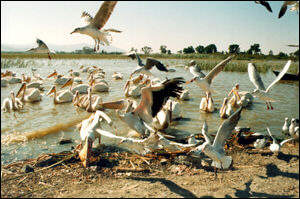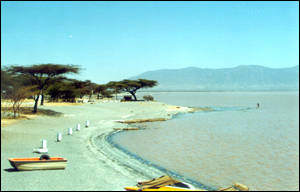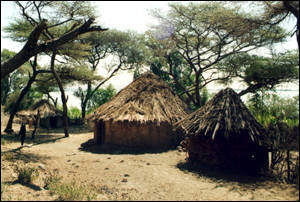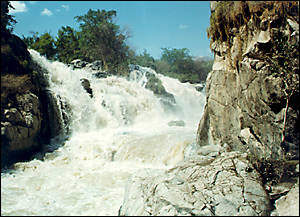 THE COMPANY, WICH SURVIVES HARD SHIPS - TOURISM THE COMPANY, WICH SURVIVES HARD SHIPS - TOURISM |
Ethiopian Airlines, which was established in 1946 as a government enterprise, has built a worldwide reputation for technical excellence, managerial efficiency, entrepreneurial and financial soundness. This reputation has survived a period of turmoil and economic stagnation starting from the mid 1970s until the fall of the military government.

Ethiopian Airlines is one of the most modern and efficient airlines in Africa flying to over 60 international and 33 domestic destinations.
The airline has developed a highly profitable network of international and domestic routes. However, the extremely long waiting time, heavy over bookings and flight cancellations indicate that the capacity shortage on the domestic still prevails.
Ethiopian Airlines is competitive on all the routes it operates. When the previous government considered protecting its domestic routes from foreign competition, the airline management insisted on, and achieved open - door policy.
The airlines international freight performance of the last ten years indicates a steady growth that is likely to be sustained in the future.
A new airport construction is being undertaken within the compound of the old one. The terminal, which is part of the three airport expansion projects , costs a total of 950 million Birr, lays on 46,000 square meters and is built by a Kuwaiti company named Mohammed Abdulmohsin Al-Kharafi and Sons which won the bid against 39 international contractors.
The three-phased project will take two and a half years to be completed and upon completion will serve from six to seven million people a year. And it will become the hub of Africa.
 Breaking the deadlock Breaking the deadlock |
Tourism is a lately recognized economic sector as compared to agriculture, industry, mining and others.
Tourism in Ethiopia was recognized in 1962 when the Imperial Premier's Office opened a department to co-ordinate and direct tourism activities in the country.
Conflicts and wars which occur continuously every time here and there, shortage of transport and communications, shortage of higher standard hotels and other entertainment facilities, failure in organizing the existing tourist attractions, mass media's failure in introducing and advertising tourist attractions, shortage of many and skilled manpower and economic policy of the Dergue regime have hampered the development of the tourism industry.
However, after the implementation of a free market economic policy there is a good result. When Mr. Yusuf Abdullahi Sukkar, Commissioner of the Ethiopian Tourism Commission elaborates this fact, " In 1991 there was only one national tour operator, but now we have about 110 tour operators and ticket agents in the country. About 40 of them are only operating on tours. As we believe in public and private sector partnership, the Ethiopian Tourism Commission has been working and promoting jointly with these private investors. During the last 5 - 6 years, the arrivals of tourists have increased by 50 percent."

The varied nature of Ethiopia's numerous attractions indicates a great potential for many types of tourism. There are even more wonders beyond what can be expressed in words, and tourists should need to pay a visit to this wonderful highland to find out the beauty of the land for themselves.
Among the major historical attractions are ancient cities such as Axum with its stelae needles and reputed to be the last repository of the Ark of the covenant, Gonder a city of castles, Lalibela a holy town with churches carved out of rock, and Lake Tana at the source of the Blue Nile is studded with island monasteries.
Mr. Yusuf says, " We have wide variety of attractions as far as tourism is concerned. We can offer history, culture, wild life, scenery movies and friendly people to the international world. We can provide almost every thing combined together."
Ethiopia is a land of infinite geographical variety and a country with a long rich and diverse history.
As the country opens up after the grim years of military dictatorship, civil war and gross mismanagement, it is becoming a fascinating destination for modern tourists.
| Moreover, tourists would be attracted, by the lures of Ethiopian good weather and Ethiopia's tourism motto of " Thirteen Months of sunshine "
One of the objectives of the Tourism Commission is to support and encourage the private sector to invest in tourism facilities. With the country's many attractions and the search by tourists for new and exciting destinations, this offers attractive opportunities for investors.

Addis Ababa Hilton, which was built 30 years ago, is undergoing a multi million-dollar refurbishment of the rooms, furniture, bathrooms, restaurants, recreation areas and technology.
The hotel, which is owned by the state and leased by Hilton International, has undertaken the 18-month project with little inconvenience to guests.
Mr. Olivier Vetter, General Manager of Addis Ababa Hilton, says, " It was to diversify the investment in order to meet most number of needs, with the scope of what is really required. It is not a question of spending a lot money in one place, but a question of spending them in different places."
The mushrooming of new privately owned international hotels here and there, especially in Addis Ababa, has made the competition very fierce in the hotel and tourism industry.
" I think we see the market growing slow, but in a very stable way. We have seen it through the recent bad times. We generally see a year to year growth of the market. " Mr. Olivier Vetter says " We just intend to continue developing the hotel, in this diverse markets that we put together which includes everything from business travelers on the executive form, to medium and low budget travelers."
 A Pride of Ethiopia A Pride of Ethiopia |
Sheraton Addis, owned by the business tycoon Sheik Mohammed H. Al-Amoudi has joined the ranks of the finest luxury hotels in the world becoming Africa's first Sheraton Luxury Collection. " Sheraton was always interested to come to Ethiopia. It is the biggest project in Africa. We were the 53rd of the Luxury collection. We can then see Ethiopia as a diplomatic, and a cultural center. Besides, it is the only country in Africa that can provide historical and natural tourism combined together " says the General Manager, Mr Jean-Pierre Manigoff.
Located around the historic hot spring, "Filwoha", which lured Emperor Menelik II to build his palace

around this same place, Sheraton Addis sprawls conveniently across a 20 hectare of land, 8200 feet above sea level, where one can enjoy the surrounding panorama of Addis.
The Grand Palace, the National Palace, the UN Economic Commission for Africa, the United Nations Conference Center and other key spots in the metropolis are placed close to the Luxury Collection. Mr Manigoff says:" Taking into consideration, that the country is a diplomatic center, the size of the population, there was not a hotel of such class in the country, that the E.C.A engaged itself to construct a modern conference center, and that the owner was ready to invest enough to construct Sheraton Addis. Now, we have a hotel with very high technologies that corresponds to the world highest standards ".
The "Hotel de Grand Luxe" , which is said to have combined the richest elements of the Ethiopian culture with neoclassical and international architecture has well equipped and elegantly decorated rooms, and also self-contained imposing villas.
Its size and quality of construction has made Sheraton Addis a trailblazer in the history of hotel development both in Ethiopia and Africa.
Sheraton Addis is the most modern and best service hotel in all over Africa and it has been a leading magnificent architectural grandeur in the whole of Africa, inaugurated one year and a half ago. The Hotel is only at its first phase of development, " We will enlarge our construction. We will add some restaurants, and leisure centers for businessmen and for the young . We will also have in addition some appartments, rooms, commercial center, etc. " says Mr. Manigoff. |

